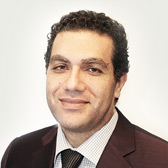Future Computing Systems: The Memristors’ Case

Speaker: Khaled N. Salama
Affiliation: King Abdullah University of Science and Technology
Abstract: Current CMOS-Based technologies are facing design challenges related to the continuous scaling down of minimum feature size according to Moore’s law. Moreover, the conventional computing architecture is no more an effectual way to fulfill modern applications demands, such as big data analysis, pattern recognition, and vector processing. Therefore, there is an exigent need to shift to new technologies, at both the architecture and the device levels. Recently, memristor devices and structures attracted attention for being promising candidates for this job. Memristor device adds a new dimension for designing novel circuits and systems. In addition, high-density memristor-based crossbar is widely considered to be the essential element for future memory and bio-inspired computing systems. However, there are numerous challenges that need to be addressed before the memristor genuinely replaces current memory and computing technologies. We believe that our contributions to the emerging technology help in pushing it to a next level and shorten the way for better futuristic computing systems.
Biography: Khaled N. Salama received the B.S. degree from the Department of Electronics and Communications, Cairo University, Cairo, Egypt, in 1997, and the M.S. and Ph.D. degrees from the Department of Electrical Engineering, Stanford University, Stanford, California, in 2000 and 2005, respectively. He was an Assistant Professor at Rensselaer Polytechnic Institute (RPI), New York, between 2005 and 2009. He joined King Abdullah University of Science and Technology (KAUST) in January 2009, where he is now an Associate Professor, and was the founding Program Chair until August 2011. His work on CMOS sensors for molecular detection has been funded by the National Institutes of Health (NIH) and the Defense Advanced Research Projects Agency (DARPA), awarded the Stanford–Berkeley Innovators Challenge Award in biological sciences and was acquired by Lumina Inc. He is the author of 150 papers and 14 patents on low-power mixed-signal circuits for intelligent fully integrated sensors and nonlinear electronics specially memristor devices.
For more information, contact Prof. Mona Jarrahi (mjarrahi@ucla.edu)
Date/Time:
Date(s) - Mar 03, 2016
1:30 pm - 3:00 pm
Location:
E-IV Tesla Room #53-125
420 Westwood Plaza - 5th Flr., Los Angeles CA 90095
